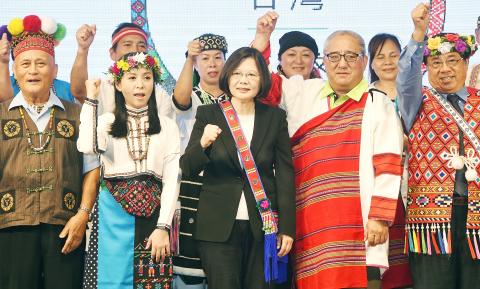Democratic Progressive Party (DPP) Chairperson Tsai Ing-wen (蔡英文) yesterday vowed to push for legal recognition of Pingpu Aborigines as well as Aboriginal autonomy once elected president.
Tsai made the vows during a news conference in Taipei to present her Aboriginal policy platform, marking her first policy presentation since she received the DPP’s official nomination as its presidential candidate.
“The DPP has not forgotten that Pingpu Aborigines are also members of Taiwan’s indigenous peoples, and they are entitled to the same degree of protection of their rights [as legally recognized Aboriginal people are] once their Aboriginal status is restored,” Tsai said, triggering a round of loud applause. “We will recognize the Pingpu Aborigines’ identity and right to make policy and laws, as well as actively preserve Pingpu languages and cultures, and, of course, as the population of [legally recognized] Aborigines increases, we will also increase relevant budgets.”

Photo: Liao Chen-huei, Taipei Times
Pingpu Aborigines are a number of Aboriginal communities that live mostly in the nation’s lowland regions whose cultures and languages are seriously threatened — some have already become extinct, while others are endangered.
Having been recognized as official indigenous peoples until the end of World War II, the Chinese Nationalist Party (KMT) regime ended official recognition of their ethnic status in the 1960s due to a series of administrative failures. In recent decades, Pingpu Aborigines have been campaigning for recognition of their Aboriginal status.
Tsai also said that, if elected, she would apologize to the nation’s Aborigines as president on behalf of the government.
“Why apologize? Well, looking back through history, Aborigines gradually lost their lands while under the rule of different governments and foreign powers,” Tsai said. “Even today, they continue to be at a disadvantage in areas including economy, education and health.”
The government must honestly face the exploitation and injustices suffered by Aborigines, the causes of the problems, Tsai said, so that reconciliation and transitional justice can be brought about.
Tsai also said that, if elected, she would push for Aboriginal autonomy, which would include clear definition of domains, land ownership and stable sources of income.
“The structure of the autonomous governments should be formed only after having fully negotiated with Aborigines on an equal basis,” Tsai said. “And Aboriginal communities must enjoy legal status as well.”

ANOTHER EMERGES: The CWA yesterday said this year’s fourth storm of the typhoon season had formed in the South China Sea, but was not expected to affect Taiwan Tropical Storm Gaemi has intensified slightly as it heads toward Taiwan, where it is expected to affect the country in the coming days, the Central Weather Administration (CWA) said yesterday. As of 8am yesterday, the 120km-radius storm was 800km southeast of Oluanpi (鵝鑾鼻), Taiwan’s southernmost tip, moving at 9kph northwest, the agency said. A sea warning for Gaemi could be issued tonight at the earliest, it said, adding that the storm is projected to be closest to Taiwan on Wednesday or Thursday. Gaemi’s potential effect on Taiwan remains unclear, as that would depend on its direction, radius and intensity, forecasters said. Former Weather Forecast

As COVID-19 cases in Japan have been increasing for 10 consecutive weeks, people should get vaccinated before visiting the nation, the Centers for Disease Control (CDC) said. The centers reported 773 hospitalizations and 124 deaths related to COVID-19 in Taiwan last week. CDC Epidemic Intelligence Center Director Guo Hung-wei (郭宏偉) on Tuesday said the number of weekly COVID-19 cases reported in Japan has been increasing since mid-May and surpassed 55,000 cases from July 8 to July 14. The average number of COVID-19 patients at Japan’s healthcare facilities that week was also 1.39 times that of the week before and KP.3 is the dominant

The Chinese Communist Party’s (CCP) working group for Taiwan-related policies is likely to be upgraded to a committee-level body, a report commissioned by the Mainland Affairs Council (MAC) said. As Chinese President Xi Jinping (習近平) is increasingly likely to upgrade the CCP’s Central Leading Group for Taiwan Affairs, Taiwanese authorities should prepare by researching Xi and the CCP, the report said. At the third plenary session of the 20th Central Committee of the CCP, which ended on Thursday last week, the party set a target of 2029 for the completion of some tasks, meaning that Xi is likely preparing to

US-CHINA TRADE DISPUTE: Despite Beijing’s offer of preferential treatment, the lure of China has dimmed as Taiwanese and international investors move out Japan and the US have become the favored destinations for Taiwanese graduates as China’s attraction has waned over the years, the Ministry of Labor said. According to the ministry’s latest income and employment advisory published this month, 3,215 Taiwanese university graduates from the class of 2020 went to Japan, surpassing for the first time the 2,881 graduates who went to China. A total of 2,300 graduates from the class of 2021 went to the US, compared with the 2,262 who went to China, the document showed. The trend continued for the class of 2023, of whom 1,460 went to Japan, 1,334 went to